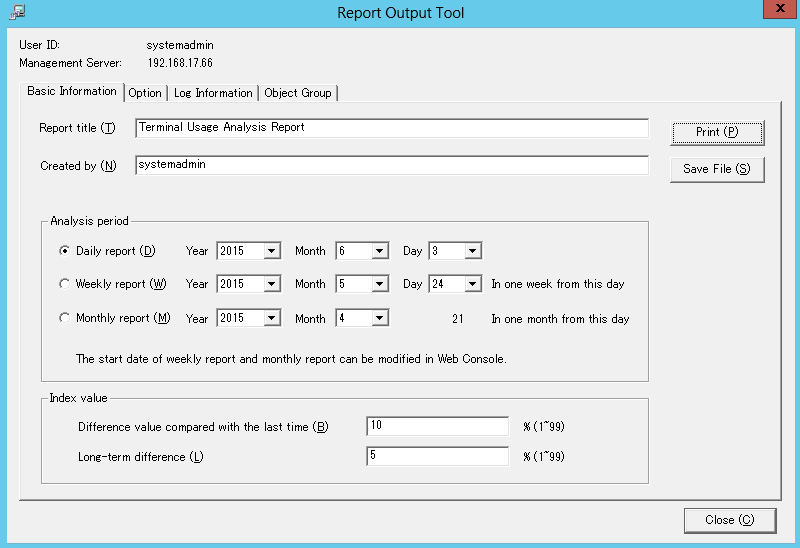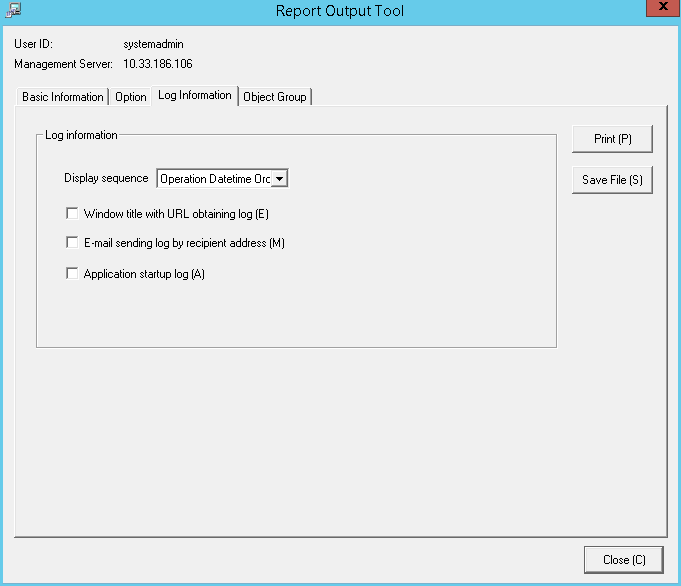Select Terminal Usage Analysis in the Report Output Tool window.
The following window is displayed.

Set the items of each tab.
The settings of each tab will be saved in the Log Analyzer Server as inherent information of login user when Print or Save File is performed. The saved information will be displayed at next startup.
The settings of the Basic Information tab can be applied to the output of the Information disclosure analysis report. Refer to "Settings of [Basic Information] tab".
The settings of the Option tab can be applied to the output of the Information disclosure analysis report. Refer to "Settings of [Option] tab".
Set the following items.

Select this when outputting the log used in the aggregation of ranking.
Output the file that is different from the terminal usage analysis report in CSV format.
Item Name | Description |
|---|---|
Display sequence | Select the log display sequence from one of the following: |
Window title with URL obtaining log | Output Window title obtaining log with URL as a single file. |
E-mail sending log by recipient address | Output log of E-mail sending log by recipient address as a single file. |
Application startup log | Output application startup log as a single file. |
Set whether the Object Group List can be output to report.
The settings of this tab can be applied can be applied to the output of the Information disclosure analysis report. Refer to "Settings of [Object Group] tab".
Click the Print or Save File button.
Note
Do not operate Microsoft(R) Excel in the process of report output
Do not perform the New and Open operation of Microsoft(R) Excel file in the report output process, as report output may not be performed normally.
In addition, confirm whether Microsoft(R) Excel was started correctly before doing the report output. When Microsoft(R) Excel is not started correctly, problems such as the report output process taking too much time and being unable to finish will occur.
When clicking the [Print] button:
Print the generated report and logs used for the aggregation of ranking.
In the displayed Print window, set the printer and print the report.
Point
The Printing Dialog Box may hide behind the Report Output Tool.
When the Printing Dialog Box is not displayed after a long time, it may hide behind the Report Output Tool.
When clicking the [Save File] button:
Save the generated report and logs used for the aggregation of ranking as a file.
Note
Save the output report to a safe place.
The output report may contain personal information and system configuration information. Specify a folder that has been implemented sufficient security policy as the target for saving the file.
[Example]
Set the access authority of the folder to allow only the administrator to view.
In the displayed saving window, specify the destination for saving and click the Save File button.
Each file will be saved with the following name.
Report File:
Default Name: Cmuse _ [Analysis Period] _ [Start Date of Analysis Period].xls
(When a file with same name exists, the confirmation dialog for overwriting will be displayed.)
Analysis period
Daily report: daily
Weekly report: weekly
Monthly report: monthly
Start date of analysis period: YYYYMMDD (date set in the Analysis Date of the Basic Information tab)
CSV File of Log:
Log Type | CSV File Name |
|---|---|
Window Title Obtaining with URL | Cmuse_Log_Webaccess_YYYYMMDD.csv |
E-mail Sending Log by Recipient Address | Cmuse_Log_Mailsend_YYYYMMDD.csv |
Application Startup | Cmuse_Log_AppStartup_YYYYMMDD.csv |
When a file with same name exists, the number with () will be added to the end of file name.
Example: Cmuse_Log_Webaccess_YYYYMMDD(2).csv
The following will be are (3) and (4), etc.